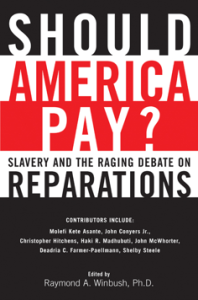Reparations Awareness Day
Posted February 25th, 2013 by James DeWolf PerryCategory: Repair and reparations Tags: Jim Crow, legacy of slavery, Reparations for slavery, slavery
 Today is Reparations Awareness Day, a day that has been designated for more than a decade to promote reparations for slavery in the United States.
Today is Reparations Awareness Day, a day that has been designated for more than a decade to promote reparations for slavery in the United States.
What do you think? Should reparations be offered for the nation’s history of slavery and racial discrimination? Why or why not?
Background
February 25 was originally designated as Reparations Awareness Day by N’COBRA, the National Coalition of Blacks for Reparations in America, following a series of demonstrations organized by the group in the early 1990s. The occasion has since been formally recognized by a variety of organizations, including the New York City Council, churches, and institutions of higher education.
Reparations for slavery have traditionally been understood as financial payments to the descendants of those enslaved in the United States, as compensation for the injustice and suffering endured by their ancestors. However, this is not how most reparations advocates think about the issue today, and there have been a variety of books, articles, and conferences devoted to exploring the subject in greater detail; see, for instance, Ray Winbush’s Should America Pay? Slavery and the Raging Debate on Reparations (2003).
N’COBRA calls for reparations for the transatlantic slave trade, for slavery , for the Jim Crow era, and for the ways in which individual and institutional forms of racial discrimination and inequality persist in the United States today.
Following this understanding of reparations, N’COBRA seeks compensation for all those of African descent in the United States today, not just those whose ancestors were enslaved, in recognition of the ways in which all black Americans suffer discrimination and unequal opportunities to this day.
Interestingly, N’COBRA focuses on the effort to obtain reparations from governments and from corporations which have played a role in slavery and racial discrimination, but also calls for reparations from religious institutions, individuals, and families—including, presumably, our own DeWolf family—which have directly benefited from slavery.
Finally, N’COBRA calls for reparations to take a variety of forms, as necessary to address past and present harms. N’COBRA explains these forms of reparations as follows:
The material forms of reparations include cash payments, land, economic development, and repatriation resources particularly to those who are descendants of enslaved Africans. Other forms of reparations for Black people of African descent include funds for scholarships and community development; creation of multi-media depictions of the history of Black people of African descent and textbooks for educational institutions that tell the story from the African descendants’ perspective; development of historical monuments and museums; the return of artifacts and art to appropriate people or institutions; exoneration of political prisoners; and, the elimination of laws and practices that maintain dual systems in the major areas of life including the punishment system, health, education and the financial/economic system. The forms of reparations received should improve the lives of African descendents in the United States for future generations to come; foster economic, social and political parity; and allow for full rights of self-determination.



Leave a Reply